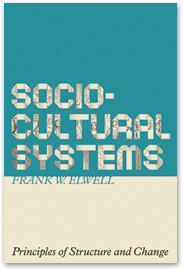
Sociocultural Systems: Principles of Structure and Change Macrosociology: Four Modern Theorists A Commentary on Malthus" 1798 Essay as Social Theory Great Classical Social Theorists In the Classical Tradition: Modern Social Theorists Dr. Elwell's Professional Page
|
rbert Spencer's Evolutionary Sociology T. Robert Malthus [1766-1834] | |
|
Malthus’s Population Principle Explained
By Frank W. Elwell
This essay is a faithful summary of Malthus’s original 1798 “Principle of
Population.” While nothing will substitute for reading the original
essay with an open mind, I hope this summary will go some way toward
rehabilitating this man’s reputation.
Malthus first points out that human nature being what it is, the passion
between the sexes appears to be fairly constant and, if unchecked population
will double itself every twenty-five years. "Population, when unchecked,
increases at a geometrical ratio. Subsistence increases only in an
arithmetical ratio. A slight acquaintance with numbers will show the
immensity of the first power in comparison with the second."
Here is the key to that riddle: Malthus made the mistake of illustrating the
unequal powers of production and reproduction with a mathematical
illustration. He supposes that when unchecked, the earth’s human population
would double every twenty-five years (a good estimate consistent with
current knowledge). Agricultural production at best, he argues, could not
possibly keep pace.
But to make the argument more general and less interrupted by the partial
views of emigration, let us take the whole earth, instead of one spot,
and suppose that the restraints to
population
He knows full well that population cannot grow long beyond the means of
subsistence (“population must always be kept down to the means of
subsistence”), he is simply trying to illustrate to his readers the unequal
powers of growth in population and food production and therefore the
necessity of checks on population. At one point in the Essay he even states:
“I am sufficiently aware that the redundant twenty-eight millions, or
seventy-seven millions, that I have mentioned, could never have existed”
(63). But for various reasons many critics have taken this mental experiment
as the theory of population itself and delight in writing that Malthus was
wrong, that overshoot and collapse did not occur.
Contrary to popular belief (and the belief of many who should know better),
Malthus did not predict a future in which population would outrun food
supply and eventually collapse.
Other critics write that Malthus was wrong because he did not take into
account the possibility of dramatic increases in the production of food.
Many criticize him for not taking into account the revolution in
agriculture. But he anticipated this argument as well:
No limits whatever are placed to the productions of the earth; they may
increase for ever and be greater than any assignable quantity, yet still the
power of population being a power of a superior order, the increase of the
human species can only be kept commensurate to the increase of the means of
subsistence by the constant operation of the strong law of necessity acting
as a check upon the greater power (9-10).
It makes no difference how much productivity increases, Malthus writes, it
could not long keep up with unrestrained reproduction. Population must be
constantly checked to keep it in line with what the earth can produce.
What are these checks that Malthus writes about? They are of two types:
“Preventive checks” come into play through the “foresight of the
difficulties attending the rearing of a family” (22). They include celibacy,
contraception, and various forms of non-procreative sex. “Positive checks,”
are the “actual distresses of some of the lower classes, by which they are
disabled from giving the proper food and attention to their children” (22).
Under this heading Malthus includes extreme poverty, diseases, plague,
malnutrition, wars, infanticide, and famine. Positive checks are far more
likely to operate within poor populations; preventive checks among the upper
classes. In Malthus’s view, both positive and preventive checks—or the ways
a people go about controlling their fertility—will greatly impact the rest
of the sociocultural system.
Malthus’s principle of population is basically the law of supply and demand
applied to the relationships between food production and population growth,
which he makes clear time and again throughout the Essay. As the food
supply increases, food becomes cheaper, and more children are brought into
the world. As there are more mouths to feed, food becomes more expensive,
thus causing stress on families, more children dying or steps taken to
prevent conception itself. As food prices rise, more land is put under the
plow, or greater efforts made in intensifying the production of the land
itself.
While Malthus recognized that the relationships among the fertility of
people and land are a good deal more complex than this simplified assertion,
he maintained there is a recurrent reciprocal relationship between the two.
Because of this reciprocal relationship between population and
Because people can reproduce faster than they can increase the production of
food, population must always be checked through positive or preventive
means. This and nothing more, is Malthus’s “Principle of Population.” Over
the course of sociocultural evolution, however, the long-term tendency has
been for both productivity and population to intensify. This reciprocal
growth, of course, has great effect on other parts of the sociocultural
system. For a more extensive discussion of Malthus’s theories refer to Macro Social Theory by Frank W. Elwell. Also see Sociocultural Systems: Principles of Structure and Change to learn how his insights contribute to a more complete understanding of modern societies.
Bibliography
Elwell, F. (2009), Macrosociology: The Study of Sociocultural Systems.
Lewiston: Edwin Mellen Press.
Elwell, F. (2013), Sociocultural Systems: Principles of Structure and
Change. Alberta: Athabasca University Press.
Malthus, T. R. (Thomas Robert) (2012-05-12). An Essay on the Principle of
Population. Kindle Edition.
Referencing this Site To reference Malthus's Population Principle Explained you should use the following format: Elwell, Frank W., 2003, "Malthus's Population Principle Explained," Retrieved August 31, 2013, [use actual date] http://www.faculty.rsu.edu/~felwell/Theorists/Essay/Malthus1.htm ©2013 Frank Elwell, Send comments to felwell at rsu.edu
|
 And this leads
to Malthus’s principle of population. Because of this unequal power between
production and reproduction, "population must
always be kept down to the level
of the means of subsistence.” While Malthus was not the first one to notice
this, he was the first to inquire into the means by which this leveling of
population is achieved. The key word in the principle is “always.” Why then
do people insist that Malthus predicts a future of population overshoot and
collapse?
And this leads
to Malthus’s principle of population. Because of this unequal power between
production and reproduction, "population must
always be kept down to the level
of the means of subsistence.” While Malthus was not the first one to notice
this, he was the first to inquire into the means by which this leveling of
population is achieved. The key word in the principle is “always.” Why then
do people insist that Malthus predicts a future of population overshoot and
collapse? While
it has become a commonplace in the literature to claim that increased
productivity has disproved Malthus’s main contention of the need for
population checks this is simply not the case. Assuming 700 million people
at the time of the Essay (an estimate widely reported in the literature, and
a 25-year doubling time for unchecked population (what modern demographers
call “fecundity”), today’s population would now be close to 48 billion. It
is not nearly so high (7 billion as of this writing) because there have been
constant checks on population in the last 200 years. While food productivity
has increased substantially, it has not (nor could it) increase at the same
rate as unchecked population growth. Rather, in accordance with Malthus’s
theory, the rise in productivity in the last 200 years has been met by a
substantial rise in population a rise that has been truly exponential though
far less than potential unchecked growth.
While
it has become a commonplace in the literature to claim that increased
productivity has disproved Malthus’s main contention of the need for
population checks this is simply not the case. Assuming 700 million people
at the time of the Essay (an estimate widely reported in the literature, and
a 25-year doubling time for unchecked population (what modern demographers
call “fecundity”), today’s population would now be close to 48 billion. It
is not nearly so high (7 billion as of this writing) because there have been
constant checks on population in the last 200 years. While food productivity
has increased substantially, it has not (nor could it) increase at the same
rate as unchecked population growth. Rather, in accordance with Malthus’s
theory, the rise in productivity in the last 200 years has been met by a
substantial rise in population a rise that has been truly exponential though
far less than potential unchecked growth. production,
over the course of sociocultural evolution, both population and food
production have grown in tandem. Periods of increase in food productivity,
whether because of the application of technology or the expansion of
cultivated land, have been met with expansions of population. Periods of
stability in food production, or contraction in productivity, have been
marked by the same phenomena in population level.
production,
over the course of sociocultural evolution, both population and food
production have grown in tandem. Periods of increase in food productivity,
whether because of the application of technology or the expansion of
cultivated land, have been met with expansions of population. Periods of
stability in food production, or contraction in productivity, have been
marked by the same phenomena in population level.